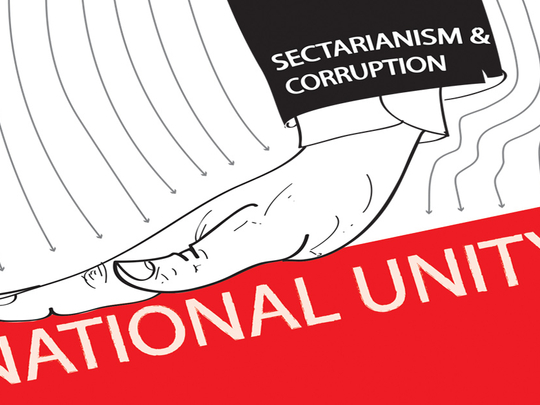
The difficulties encountered by Haidar Abadi, Iraq’s Prime Minister, in confronting Daesh (Islamic State of Iraq and the Levant) cannot be overlooked by anyone observing the situation in Iraq today. Abadi’s government is also in an embarrassing position due to its inability to fight the terrorist organisation whose strength in Iraq’s western region has not subsided despite the aerial strikes by the coalition forces.
Moreover, everyone is convinced that these air strikes cannot defeat Daesh and that local forces are needed on the ground to face the deadly group. Some argue that only Sunni tribes can defeat the terrorist organisation and that the government has to strike an alliance with these tribes and arm them. In other words, these observers find it necessary to re-establish the Awakening Councils that worked with great efficiency in overcoming this organisation back in 2006 and that the Iraqi government has to prioritise backing these tribes, which is the stand adopted by the US government.
However, the fact that Awakening Councils were one of the major reasons behind the distrust between the central government and Sunni tribes does not encourage setting up these councils once again. Former prime minister Nouri Al Maliki’s government had repudiated the Awakening Councils and marginalised them, thereby leading to feelings of frustration that generated a lot of doubts about the government’s sincerity, intentions and the feasibility of any cooperation between Sunni tribes and the government.
Regrettably, this is a small part of the heavy burden left for Iraq to shoulder as a result of Al Maliki’s eight-year-old despotic rule. During that period, he set up establishments that were ripe with corruption under the very eyes of a parliament that was tamed by Al Maliki himself and allies he was able to entangle in his schemes, thus leaving behind an empty state treasury and an increasingly confused economy with declining global oil prices. If we assume that this obstacle can be overcome in the light of Abadi’s good intentions and his expressed desire for change, sadly, the circumstances have changed immensely since 2006 when US forces were present in Iraq and worked as an umbrella for agreements between Sunni tribes and the government. Moreover, Al Qaida was not as powerful then as Daesh is today.
The tribes and officials in the Anbar province are needed to intervene to help ground forces, whether Iraqi or foreign. The Anbar Provincial Council has recently called for US intervention to help out because of the government’s inability to deal with the situation. The Anbar tribes find great difficulties in facing Daesh, which targeted the Al Bu Nimir clan, which is one of the largest clans of the Al Dulaim tribes and slaughtered them mercilessly, which demonstrates the power enjoyed by Daesh in the province.
The government’s capabilities are very limited and they find great difficulties in sending supplies, soldiers and weapons after Daesh blew up many bridges. As a result, means of communication with these clans became riddled with difficulties. Simply put, limited air support has not altered the equations of power on the ground.
On the other hand, others argue that arming tribes is a strategic error that will have serious implications in the long run and it is not the best solution under the circumstances in Iraq today simply because access to weapons should be restricted exclusively to the security forces of any sovereign state. The alternative suggested by a number of observers is two fold: One is of a political nature and proposes that the state should represent itself as an Iraqi establishment for all. This establishment must make swift efforts to address the reasons behind tensions, marginalisation, exclusion and rejection of retaliatory policies and to take strict measures to combat sectarianism and to issue a decision to dissolve all militias and prosecute those who do not abide by it. The other proposal is in the context of the military, where procedures are required to re-build a professional Iraqi army established upon pure national foundations.
However, the reality is very different as there are procedures to set up the national guards made up of the sons of every governorate as a parallel force for the army and police. The function of this new national force will be maintaining security in different provinces to implement the political agreement between the different parliamentary blocs in Abadi’s government, which decided during its first meeting on September 9 to prepare a draft law for establishing the “National Guard” and organising the issue of a “popular army”. There are many reservations about this agreement because it affects the Iraqi Army and minimises its role, in addition to the fact that it will serve as a catalyst for isolation and will enhance the spirit of regional affiliations, which may lead to revival of calls for dividing Iraq.
Iraq’s war against Daesh differs from that of the Coalition forces’ against this deadly group. Iraq’s war is against terrorism, in addition to corruption, mismanagement and is truly expressed by Abadi as he stated in the communique released by his media office: Corruption is the heaviest burden inherited by the government.
Mohammad Akef Jamal is an Iraqi writer based in Dubai.










